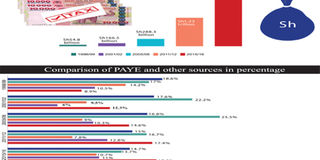Salaried workers’ tax burden

What you need to know:
The report by the National Bureau of Statistics (NBS) shows that PAYE, which is deducted from the monthly salaries of employees, accounts for about 17 per cent of gross tax -- the highest of all tax revenues.
Dar es Salaam. The amount of Pay-As-You-Earn (PAYE) collected by Tanzania Revenue Authority (TRA) has gone up 40 times during the past 18 years, as salaried workers become increasingly important in funding the government’s budget, a new study shows.
The report by the National Bureau of Statistics (NBS) shows that PAYE, which is deducted from the monthly salaries of employees, accounts for about 17 per cent of gross tax -- the highest of all tax revenues.
The main contributors of PAYE are middle and higher earners who pocket monthly salaries from Sh720,000 upwards.
The NBS report has shown that tax collections from salaried employees increased from Sh54.681 billion in 1998/99 to Sh2.24 trillion in 2015/16.
During the financial year 2016/17, PAYE was Sh627 billion out of the total revenue of Sh14 trillion.
The share of PAYE however gained from fourth position with 7.6 per cent of the gross tax collections in 1996/97, when the TRA was established to the first position since 2009/10 when its share increased to 16.3 per cent.
Ten years ago (2006/07) VAT on imports was the leading source as its share was 17.7 per cent, followed by domestic VAT with 16 per cent while PAYE became third with 15.6 per cent.
Analysts are of the view that continued efforts to attract investment, coupled with a drop in PAYE rates have seen the source gaining ground against others.
PAYE has been cut by 50 per cent in ten years to 9 per cent from 18 per cent in 2006/07.
The share of corporate tax, which is paid from gross revenue of companies, has shrunk to 10.4 per cent during 2015/16 from 15 per cent in 2013/14.
Earnings survey report
Tanzania had 2.3 million formal employees, of whom 0.7 million are in the public sector and 1.6 million in the private sector, according to employment and earnings survey report for 2015.
According to Tanzania Employers Association official William Lumwaga, an increase of PAYE share to gross revenue is a result of increased control of revenue leakages, as well as intensified anti-corruption strategies.
Dr Lumwaga hopes that efforts to formalise informal businesses will lead to an increase in the number of companies and formal income generation.
“The reduction of PAYE from 11 per cent to 9 per cent led to more talent retention and attracted more investments, creating more employment opportunities.”
A senior lecturer in development studies at the University of Dar es Salaam, Dr Robert Mhamba, said a huge chunk of taxes was collected formal small and medium-sized enterprises, which employ two to ten people.
“This indicates that there has been an increase in formal employment and many people are now engaged with salaried employment.”
Dr Mhamba said the stabilisation of fiscal policy and increased the exploitation of natural resources.
The situation stimulated the opening up of enterprises, mainly small and medium, which created more salaried jobs.




